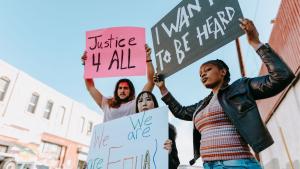
Advocating for the Vulnerable
Injustice can be seen everywhere in this world. You see it publicly, at work and in the home. Christians are called to stand to do more, to be more. Christians are called to be the defenders of the oppressed. This can be seen echoed throughout scripture. From human trafficking to gender-based violence, there are countless injustices that disproportionately affect women and children, and it is our responsibility as believers to advocate for their rights. We need to see people as people.
The Call to Justice in Scripture
The Bible consistently emphasizes the importance of justice and caring for the marginalized. Isaiah 1:17 implores us to “learn to do good. Make justice your aim: redress the wronged,
hear the orphan’s plea, defend the widow.” (usccb.org) This commandment is not optional for Christians. It is a mandate to actively pursue justice on behalf of those who cannot defend themselves. We are the guardians of each other.
Jesus’ ministry was full of acts of compassion and advocacy for the vulnerable. He announced His mission in Luke 4:18-19, saying, “The Spirit of the Lord is upon me, because he has anointed me to bring glad tidings to the poor. He has sent me to proclaim liberty to captives and recovery of sight to the blind to let the oppressed go free, and to proclaim a year acceptable to the Lord.” (usccb.org) We are to follow the example of Jesus. Our Baptism calls us to. Speaking up for those trapped in systems of oppression is included in that calling.
Human Trafficking: A Modern-Day Injustice
One of the gravest forms of modern-day oppression is human trafficking, often described as a form of modern slavery. Millions of women and children are coerced, deceived, and sold into a life of exploitation and abuse. The impact of this atrocity is staggering, with lives shattered and families torn apart.
Educate yourself on how this occurs where you live. Watch for the signs. Intervene whenever possible. As Christians, we are called to be a voice for the voiceless. Proverbs 31:8-9 commands, “Open your mouth in behalf of the mute, and for the rights of the destitute; Open your mouth, judge justly, defend the needy and the poor!.” (usccb.org) There are numerous faith-based organizations working to combat human trafficking by rescuing victims, providing rehabilitation services, and preventing trafficking through education and awareness. Get involved. Start advocating for the vulnerable.
Gender-Based Violence: Breaking the Silence
Gender-based violence (GBV) is another critical issue affecting women worldwide. Whether through physical, emotional, or sexual abuse, millions of women suffer in silence. Unfortunately, this issue is often swept under the rug, even in faith communities.
However, scripture speaks to the dignity of every person, regardless of gender. Ephesians 5:25-29 reads, “Husbands, love your wives, even as Christ loved the church and handed himself over for her to sanctify her, cleansing her by the bath of water with the word, that he might present to himself the church in splendor, without spot or wrinkle or any such thing, that she might be holy and without blemish. So [also] husbands should love their wives as their own bodies. He who loves his wife loves himself. For no one hates his own flesh but rather nourishes and cherishes it, even as Christ does the church,” (usccb.org) This scripture encourages men to treat women with love and care, just as Christ loves the church. As Christians, we must break the silence surrounding GBV, support survivors, and hold abusers accountable. It is through love, support, and advocacy that women can experience healing and restoration.
Advocating for the Rights of Women and Children
The plight of vulnerable women and children does not end with trafficking or GBV. Many lack access to basic rights, including education, healthcare, and economic opportunity. As the church, we are called to step into this gap.
The Proverbs 31 woman is often seen as a model for godly womanhood, but she also serves as a symbol of empowerment. She is described as a woman of strength, wisdom, and compassion, who “opens her hand to the poor and reaches out her hands to the needy” (Proverbs 31:20). This reflects God’s heart for justice and the empowerment of women to fulfill their God-given potential.
Women Supporting Women
Women are known for being jealous of each other and even being “catty.” It is far time for women to support and encourage each other. Progress has been made, but society keeps driving that wedge of competition and the need to have what others have. Stand up in support of your sister in Christ with love and encouragement. Be the advocate for other vulnerable women.
How Christians Can Get Involved
Advocacy doesn’t have to be complicated. Begin with awareness and prayer, but also include tangible action. Partner with Christian organizations that focus on these issues. You can get involved by volunteering your time, donating resources, and raising awareness in your community.
The church can also be a place of refuge and empowerment for those suffering from injustice. James 1:27 reminds us, “Religion that is pure and undefiled before God and the Father is this: to care for orphans and widows in their affliction and to keep oneself unstained by the world.”(usccb.org) Advocacy is a spiritual responsibility that each of us needs to embrace.
Your Calling to Advocate For the Vulnerable
Christians have both the spiritual mandate and the moral responsibility to defend the rights of the oppressed, particularly women and children. Through faith-led advocacy, we can create a world that reflects the justice, mercy, and compassion of Christ.
This is something that we should incorporate into our daily lives, not just during dedicated months or special seasons (like voting). How will you answer the call in faith to advocate for the vulnerable?













